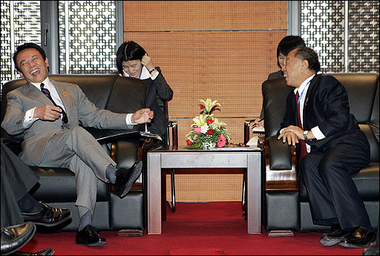China, Japan to jointly study history
By Sun Shangwu in Hanoi and Qin Jize in Beijing (China Daily)Updated: 2006-11-17 06:30
China and Japan agreed Thursday to jointly research history, a move that is expected to reduce future disputes on historical issues.
The announcement was made after a meeting between Foreign Minister Li Zhaoxing and his Japanese counterpart Taro Aso on the sidelines of the Asia-Pacific Economic Co-operation (APEC) meeting.
The joint research will be conducted according to the principles of the three political documents signed by the two countries, including the China-Japan Joint Statement, as well as with the spirit of "facing the future", according to the Chinese Foreign Ministry.
The purpose is to "deepen the objective understanding of history and increase mutual understanding."
The joint research will cover more than 2,000 years of bilateral exchanges, modern history including the Japanese invasion of China and other Asian countries, and the development of bilateral relations in the 60 years since the end of World War II.
A total of 20 scholars, 10 from each side, will establish a special committee to conduct the research, and there will be two groups in charge of ancient and modern history respectively.
The Institute of Modern History of the Chinese Academy of Social Sciences and Japan Institute of International Affairs will be responsible for the research, and they will holds conferences in rotation. The first conference will be held this year and scholars are scheduled to publish joint research results in 2008, when the two countries will celebrate the 30th anniversary of the China-Japan Peace and Friendship Treaty.
Bilateral relations soured after former Japanese Prime Minister Junichiro Koizumi repeatedly visited the Yasukuni Shrine, which honours 14 Class A convicted war criminals from World War II along with the country's war dead, after he took office in 2001.
Some politicians refuse to admit the atrocities committed by Japanese troops during World War II, which greatly hurts the feelings of Asian peoples.
During their meeting, the Chinese foreign minister said that new Japanese Prime Minister Shinzo Abe's visit to China last month has put bilateral ties on the track of normal development and the two sides should treasure such results.
He hoped that both sides could make joint efforts to "deal with sensitive issues between the two countries" and not let them interfere in the development of bilateral ties.
Li said that the question of Taiwan must be handled appropriately.
Taro said that there is no change in the Japanese Government's policy on Taiwan and will deal with the question according to the principles of the bilateral political documents.
Li yesterday also met the foreign ministers of Canada and New Zealand.
Li and his Canadian counterpart Peter MacKay agreed in their meeting that the two countries should treat bilateral relations from a "strategic perspective" and strengthen consultation on regional and international affairs.
In another development, President Hu Jintao is planning to meet with Canadian Prime Minister Stephen Harper on the sidelines of the forum.
Foreign Ministry spokeswoman Jiang Yu announced the news yesterday in Beijing amid reports that China declined meetings with Canada because of Harper's strong criticism of China's human rights record.
Jiang said China always advocates enhancing dialogue on the basis of mutual respect and equality in a bid to enlarge common understanding and narrow differences.
"However we are firmly against gossiping about and interfering in other countries' internal affairs," Jiang said at a regular press conference.
Ministerial meeting concludes
Trade ministers, foreign ministers and representatives from the APEC member economies wrapped up their two-day gathering yesterday, agreeing to continue the support for WTO negotiations and facilitate trade in the region.
During the meeting, the delegates spent a lot of time discussing the need to resume the stalled Doha Round of the WTO negotiations.
They endorsed the Hanoi Action Plan to implement the Busan roadmap for realization of the Bogor goals of free and open trade and investment in the region, Vietnamese Deputy Prime Minister and Foreign Minister Pham Gia Khiem told a press conference after the meeting.
A joint statement issued after the meeting said the delegates reaffirmed their commitment to strengthen the multilateral trading system, and recommended APEC Economic Leaders issue a stand-alone statement on the Doha Development Agenda reaffirming APEC's resolve to resume the negotiation process without any delay.
|
||
|
||
|
|

